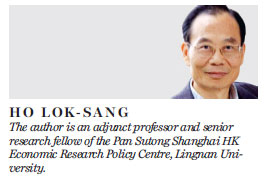Road pricing is the way forward
Updated: 2015-12-29 07:48
By Ho Lok-Sang(HK Edition)
|
|||||||
Ho Lok-sang writes that a time-sensitive electronic charging system for road use would benefit individuals and businesses alike as the cost of time keeps rising
I first proposed introducing road pricing in the city when I was still a student at the University of Hong Kong, back in the early 1970s. I edited a newspaper called SOS Environment while volunteering with the Youth Environmental Action Group of the Conservancy Association in 1972-73. In an editorial, I advocated road pricing as a way of efficiently utilizing Hong Kong's road networks.
Over 40 years have passed. Singapore has already adopted road pricing, but we continue to debate over it.
As early as 1975, Singapore adopted an area licensing scheme under which private vehicles needed to pay a day license fee of S$3 ($2.13 at today's rates) in order to enter the designated Central Business District area during rush hour. The scheme was later extended to cover certain expressways. With the advent of modern computer technology and the availability of efficient sensing devices, in 1998 Singapore launched an electronic road pricing (ERP) system. Fares are deducted from stored-value cards each time a vehicle passes a charging point.
The technology for implementing a similar scheme in Hong Kong is mature and is already well-known to local drivers and used on tollways. According to the Feasibility Study on ERP released earlier in the year, an alternative technology called Vehicle Positioning System (VPS) "offers greater flexibility and adaptability. It provides vehicle location information and wide area communications to the driver. It may also better fit future Intelligent Transport System (ITS) and Transport Information System needs."
Road pricing has proven effective in reducing traffic congestion, in Singapore as well as in London. But considerable public objection is expected. First, some say that road pricing will effectively restrict the right of use to those who can afford it, namely the rich, while excluding ordinary people who must step aside in their favor. Second, some are worried about possible intrusion into privacy. Third, road pricing may be thought to be an added burden on people and businesses alike.
However, though the rich can better afford road pricing, even the poor, and certainly the business sector, also stand to benefit from road pricing. When the roads are congested, everybody is paying a price in the form of time cost. With the cost of time rising over the years, due in part to the rising productivity of time, and in part to the increasing range of activities that people can do with their time, a reduction in congestion will certainly benefit many people, including the poor.
During times of emergency, in particular, 10 minutes saved could mean the difference between life and death. We need to remember that even poor people can travel faster on the roads and can benefit from faster emergency services with road pricing - such as police, fire and ambulance services. For businesses, the cost of time can be huge: It could mean closing a deal or blowing it.
The fact is that building more roads and wider roads actually tend to induce more car ownership and more traffic. Moreover, we have to face the fact that the cost of land has climbed higher and higher. Devoting more land to roads will be at the expense of housing, commerce, industry and community services.
Rather than charging according to passing through a charge point, I have, in an early paper published in 1986, recommended charging road users by the time they spend within a designated road network. It is not difficult to time the entry into a "charge area" and the exit from it. If the roads are very congested, the duration of stay within the charge area will be higher, and the fees charged will be higher. Thus there will be an automatic increase in the effective road price for using the roads when congestion gets serious.
Moreover, for a vehicle that goes into the area and leaves quickly the charge will be lower, compared to that for a vehicle that goes into the area and stays there for a longer period, such as when it has to load or unload or when it has to wait for a passenger. In contrast, charging on sensing cannot distinguish between truly congestion-costly vehicles from others, and cannot provide for continuous adjustment in the charging rates according to the degree of congestion.
From the technical point of view, charging according to the time of stay within the charge area is straightforward with the VPS technology. According to the feasibility study, "Although the present cost of VPS is higher than DSRC (Dedicated Short-Range Communications), the projected cost of VPS is dropping at a rate faster than that of DSRC. Hence, taking into account various aspects such as adaptability, flexibility and better integration with ITS, VPS technology offers the best-balanced choice for ERP in the longer term."
Since in any case it will be years before ERP is implemented in Hong Kong, I would strongly recommend that the SAR government seriously consider charging by time of stay within the charge area.

(HK Edition 12/29/2015 page9)